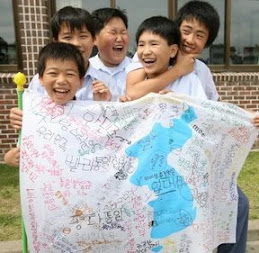
Korean Unification Studies blog highlights Gabriel Jonsson's book, Towards Korean Reconciliation: Socio-cultural Exchanges and Cooperation, which shows how sports has promoted inter-Korean reconciliation. Indeed, one of the first inter-Korea exchanges was exchange of sports games that led to unified teams in some international events, joint cheering squads and the two teams for the two sides marching together in opening ceremonies of major sporting events, including the Olympics. This gesture symbollically showed the world of the desire and possibility of Korean reunification. The two teams will likely march under the same "unification flag" (see above photo taken during an inter-Korea soccer match) in the 2008 Summer Olympics in Beijing. A joint cheering squad is planned to go to Beijing via railway through the Korean peninsula.
Sports has brought divided Koreans together like no other facet of inter-Korea reconciliation, often times one side cheering the other side, who were brought up to hate the other side, regardless of scores. In international sporting events, it is not unusual sight these days to see South Korean expatriots and overseas Koreans cheering for North Korean teams or players. It would be interesting to see how this dynamic plays out in the preliminary rounds of the 2010 FIFA World Cup, where both North and South Korea were drawn to compete against each other in one of Asia's group. Only one of the two sides will be able to proceed to the World Cup finals, but whoever wins will likely have the backing of all Koreans.
Below is a chronology of notable dates of inter-Korea sports reconciliation in Jonsson's book. It should be updated that the two teams marched together under one flag in the 2006 Winter Olympics in Turin as well as the 2006 Asian Games in Doha.
~1958 - North Korea proposes joint Korean team for 1960 Olympics
~1989 - First inter-Korean football matches played in Pyongyang (October 11), and Seoul (October 23). Jonsoon describes this as the “first real sign of progress” in inter-Korean relations. ~1991 - (April-May) A unified Korean team participates in the 41st World Table Tennis Championships in Japan, (May) Permission granted for unified Korean youth soccer team. Televised try-out sessions held in Seoul and Pyongyang, (June) A joint Korean team participates in the 6th World Junior Soccer Championships in Portugal
~1993 - (October) North and South Korea participate in the “Seventh General Meeting of the East Asian Athletic Council” in Pyongyang
~1994 - (June) Both Koreas participate in the “The Association of East Asian Athletic Meeting in Taiwan.
~1999 - (August) First North-South workers’ football matches played in Pyongyang, (September) Televised “Unification Basketball Games” played in Pyongyang, (December) “Unification Basketball Games” played in Seoul
~2000 - (July) North and South Korea play table-tennis in Pyongyang, (September – October) South and North Korea march together under the Unification Flag at the opening and closing ceremonies of the Sydney Olympic Games, (October) The sacred fire for South Korea’s National Athletic Games put on at Mt. Keumkang.
~2002 - (June) The inauguration ceremony and matches from the Soccer World Cup are televised on North Korean TV, (September) “Unification Soccer” Games in Seoul, (Sep – Oct) North Korea participates in Asian Games held in Busan. North and South Korea march together at opening and closing ceremonies.
~2003 - (February) Both Koreas march together at the Asian Winter Games held in Japan, (October) “Unification Basketball Games” held in North Korea televised on SBS.
~2004 - (August) Athens Olympics: Both Koreas march together.
~2006 - (November) North Korea supports South Korea’s bid for 2014 Pyeongchang Winter Olympics.





No comments:
Post a Comment